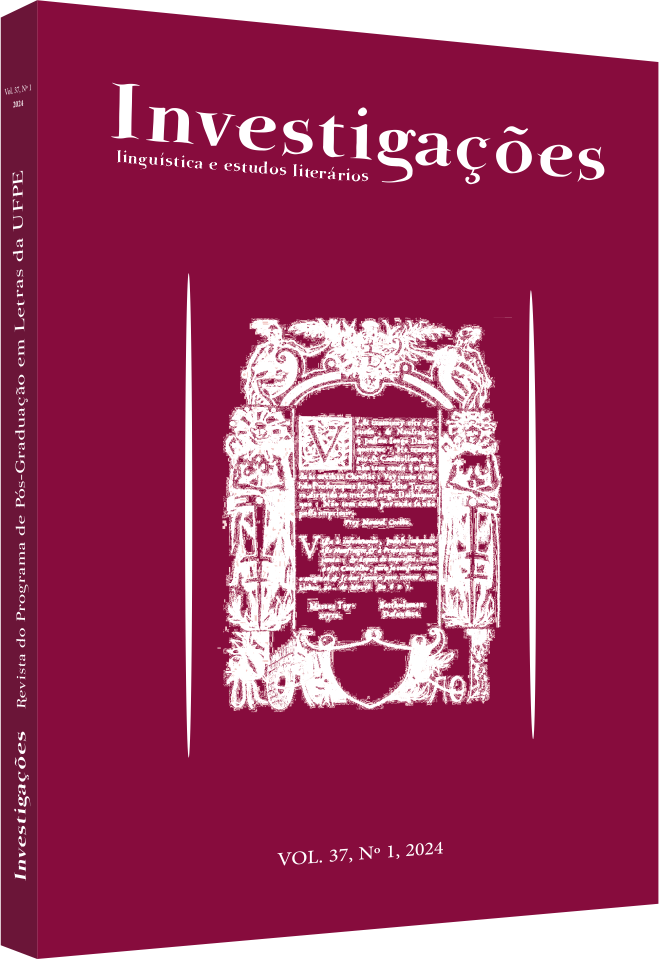António Botto and literary criticism: tension, exclusion and revalorization of homoerotic writing in Portugal
DOI:
https://doi.org/10.51359/2175-294x.2024.258329Keywords:
António Botto, portuguese poetry, literary criticism, canonAbstract
The article presents the relations of literary criticism with the poet António Botto (1898-1959), one of the most debated Portuguese modernist poets of the 1920s and 1930s. However, over the years, his poetry was continuously excluded from the emerging literary canon, mainly because of the homoerotic theme and the various tensions and questionings that surrounded the validity of his poetic writing. Thus, we undertake a brief overview of the main critical readings of Botto's poetry from the past and the present, when Botto goes through some processes of critical reassessment, especially of his primacy in portraying homoeroticism in Portuguese literature.
References
BLACKMORE, Josiah. António Botto’s Bruises of Light. In: BOTTO, António. Songs. London: University of Minensota, 2010. p. IX-XXXVI.
BOTTO, António. Poesia. Lisboa: Assírio & Alvim, 2018.
CASCAIS, António Fernando. Pessoa, louvor e execração de António Botto. In: RIBEIRO, Nuno; BASTOS, Margarida Almeida (org.). António Botto e Fernando Pessoa: poéticas em diálogo. Lisboa: Biblioteca Nacional de Portugal, 2021. p. 27-46.
CORREIA, Natália. Antologia de poesia portuguesa erótica e satírica. Lisboa: Edição Antígona/Frenesi, 2008.
FEIJÓ, António et al (Org.). O Cânone. Lisboa: Tinta da China, 2020.
FIGUEIREDO, José R. Cânone 3. In: FEIJÓ, António et al (Org.). O Cânone. Lisboa: Tinta da China, 2020. p. 173-196.
INÁCIO, Emerson da Cruz. A herança invisível: ecos da “literatura viva” na obra de Al Berto. Manaus: UEA Edições, 2013.
KLOBUCKA, Anna. O mundo gay de António Botto. Lisboa: Documenta, 2018.
LEITE, José Roberto Teixeira. António Botto: o amor e a enfermidade. Revista da Semana. Rio de Janeiro, p. 18-20, n. 20, 19 mai. 1956.
LOPES, Óscar. Entre Fialho e Nemésio: Estudos de Literatura Portuguesa Contemporânea II. Lisboa: Imprensa Nacional-Casa da Moeda, 1987.
LUGARINHO, Mário César. Literatura de Sodoma: o cânone literário e a identidade homossexual. Revista Gragoatá, Niterói, n. 14, 1. sem. 2003, p. 133-145. Disponível em: https://periodicos.uff.br/gragoata/article/view/33451. Acessado em: 30 mar. 2023.
MAGALHÃES, Joaquim Manuel. Um pouco da morte. Lisboa: Editorial Presença, 1989.
PERRONE-MOISÉS, Leyla. Altas literaturas: escolha e valor na obra crítica de escritores modernos. São Paulo: Companhia das Letras, 1998.
PITTA, Eduardo. Aula de Poesia. Lisboa: Quartzel Editores, 2010.
PITTA, Eduardo. Toda ousadia será castigada. In: BOTTO, António. Poesia. Lisboa: Assírio & Alvim, 2018. p. 3-18.
SENA, Jorge de. Estudos de Literatura Portuguesa – III. Lisboa: Edições 70, 1988.
SENA, Jorge de. Tentativa de um panorama coordenado da literatura portuguesa de 1901 a 1950. In: FRANÇA, José-Augusto. Tetracórnio: Antologia de inéditos de autores portugueses contemporâneos. Lisboa: Livraria Portugal, 1955. p. 3-26.
SILVESTRE, Osvaldo Manuel; SERRA, Pedro. Século de Ouro: Antologia Crítica da Poesia Portuguesa do Século XX. Lisboa: Angelus Novos & Cotovia, 2002.
SIMÕES, João Gaspar. António Botto. Diário de Pernambuco. Recife, 11 mai. 1941. Segunda Secção, p. 1.
ÚLTIMA HORA. António Botto (entre a vida e a morte) visto por intelectuais: Teve existência dramática. Última Hora. Rio de Janeiro, p. 3, 9 mar. 1959.
Downloads
Published
How to Cite
Issue
Section
License
Copyright (c) 2024 Oscar José de Paula Neto

This work is licensed under a Creative Commons Attribution 4.0 International License.
Authors who publish with Revista Investigações agree to the following terms:
Authors retain copyright and grant the journal right of first publication with the work simultaneously licensed under the Creative Commons Attribution 4.0 International (CC BY 4.0) license that allows others to share the work with an acknowledgement of the work's authorship and initial publication in this journal.
Authors are able to enter into separate, additional contractual arrangements for the non-exclusive distribution of the journal's published version of the work (e.g., post it to an institutional repository or publish it in a book), with an acknowledgement of its initial publication in this journal.
You are free to:
Share — copy and redistribute the material in any medium or format for any purpose, even commercially.
Adapt — remix, transform, and build upon the material for any purpose, even commercially.
The licensor cannot revoke these freedoms as long as you follow the license terms.
Under the following terms:
Attribution — You must give appropriate credit , provide a link to the license, and indicate if changes were made . You may do so in any reasonable manner, but not in any way that suggests the licensor endorses you or your use.
No additional restrictions — You may not apply legal terms or technological measures that legally restrict others from doing anything the license permits.

